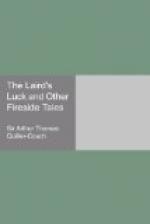To my amazement Mr. Urquhart interposed. He was, if possible, paler and more deeply agitated than before. “Sir, I entreat you not to allow Mr. Mackenzie to go. I have reasons—I was mistaken just now—”
“Mistaken, sir?”
“Not in what I saw. I refused to fight him—under a mistake. I thought—”
But I cut his stammering short. “As for you,” I said, “the most charitable construction I can put on your behaviour is to believe you mad. For the present you, too, are free to go and do your duty. Now leave me. Business presses, and I am sick and angry at the sight of you.”
It was just two in the morning when I reached the alarm-post. Brussels by this time was full of the rolling of drums and screaming of pipes; and the regiment formed up in darkness rendered tenfold more confusing by a mob of citizens, some wildly excited, others paralysed by terror, and all intractable. We had, moreover, no small trouble to disengage from our ranks the wives and families who had most unwisely followed many officers abroad, and now clung to their dear ones bidding them farewell. To end this most distressing scene I had in some instances to use a roughness which it still afflicts me to remember. Yet in actual time it was soon overhand dawn scarcely breaking when the Morays with the other regiments of Pack’s brigade filed out of the park and fell into stride on the road which leads southward to Charleroi.
In this record it would be immaterial to describe either our march or the since-famous engagement which terminated it. Very early we began to hear the sound of heavy guns far ahead and to make guesses at their distance; but it was close upon two in the afternoon before we reached the high ground above Quatre Bras, and saw the battle spread below us like a picture. The Prince of Orange had been fighting his ground stubbornly since seven in the morning. Ney’s superior artillery and far superior cavalry had forced him back, it is true; but he still covered the cross-roads which were the key of his defence, and his position remained sound, though it was fast becoming critical. Just as we arrived, the French, who had already mastered the farm of Piermont, on the left of the Charleroi road, began to push their skirmishers into a thicket below it and commanding the road running east to Namur. Indeed, for a short space they had this road at their mercy, and the chance within grasp of doubling up our left by means of it.
This happened, I say, just as we arrived; and Wellington, who had reached Quatre Bras a short while ahead of us (having fetched a circuit from Brussels through Ligny, where he paused to inspect Field-Marshal Bluecher’s dispositions for battle), at once saw the danger, and detached one of our regiments, the 95th Rifles, to drive back the tirailleurs from the thicket; which, albeit scarcely breathed after their march, they did with a will, and so regained the Allies’ hold upon the Namur road. The rest of us meanwhile defiled down this same road, formed line in front of it, and under a brisk cannonade from the French heights waited for the next move.




